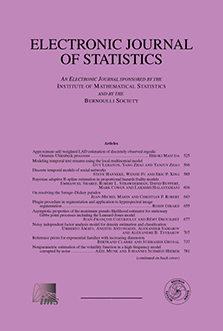Abstract
Community detection in networks has drawn much attention in diverse fields, especially social sciences. Given its significance, there has been a large body of literature with approaches from many fields. Here we present a statistical framework that is representative, extensible, and that yields an estimator with good properties. Our proposed approach considers a stochastic blockmodel based on a logistic regression formulation with node correction terms. We follow a Bayesian approach that explicitly captures the community behavior via prior specification. We further adopt a data augmentation strategy with latent Pólya-Gamma variables to obtain posterior samples. We conduct inference based on a principled, canonically mapped centroid estimator that formally addresses label non-identifiability and captures representative community assignments. We demonstrate the proposed model and estimation on real-world as well as simulated benchmark networks and show that the proposed model and estimator are more flexible, representative, and yield smaller error rates when compared to the MAP estimator from classical degree-corrected stochastic blockmodels.
Citation
Lijun Peng. Luis Carvalho. "Bayesian degree-corrected stochastic blockmodels for community detection." Electron. J. Statist. 10 (2) 2746 - 2779, 2016. https://doi.org/10.1214/16-EJS1163
Information





